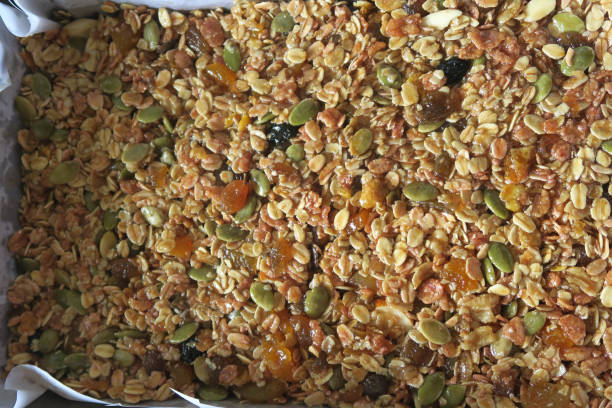The Origins of Muesli: A Journey Through Time and Culture

Muesli, a breakfast staple enjoyed by many around the world, has a rich history that spans cultures and centuries. Its journey from a simple Swiss dish to a global phenomenon is a fascinating tale of culinary evolution and cultural adaptation. Let's explore the origins of muesli and its journey through time and culture.
The Birth of Muesli
Muesli was created in the early 20th century by Swiss physician Maximilian Bircher-Brenner. Dr. Bircher-Brenner was ahead of his time in recognizing the health benefits of raw, plant-based foods. He developed muesli as a nutritious meal for patients in his hospital, emphasizing the importance of a diet rich in fresh fruits, nuts, and whole grains. His original recipe, known as "Bircher muesli," included rolled oats soaked in water or milk, mixed with grated apples, nuts, lemon juice, and condensed milk.
Muesli in Switzerland
In Switzerland, muesli quickly became popular not just as a health food but also as a versatile and delicious breakfast option. The Swiss appreciated its simplicity and nutritional value, making it a staple in their daily diet. The traditional Swiss muesli often includes a mixture of oats, nuts, seeds, and fresh or dried fruits, providing a balanced combination of carbohydrates, protein, and healthy fats.Muesli Spreads Across Europe
As travel and communication improved in the mid-20th century, the popularity of muesli spread across Europe. In Germany, it became known as "Müsli" and was adapted to local tastes, often incorporating regional ingredients. The Scandinavian countries also embraced muesli, adding their own twist with the inclusion of berries and nuts native to the region.
Muesli Goes Global
By the late 20th century, muesli had made its way to North America, Australia, and beyond. The health food movement of the 1960s and 1970s played a significant role in popularizing muesli in these regions. Health-conscious consumers were drawn to its wholesome ingredients and ease of preparation. As muesli gained global popularity, commercial variations emerged, offering a wide range of flavors and ingredient combinations.
Modern Muesli: A Fusion of Flavors
Today, muesli is enjoyed in countless variations around the world. In the United States, you might find muesli mixed with yogurt and honey, topped with fresh berries. In Australia, it’s common to see muesli incorporated into smoothie bowls or served with tropical fruits. The versatility of muesli allows it to be customized to suit diverse tastes and dietary preferences.
The Cultural Significance of Muesli
Muesli’s evolution reflects broader cultural trends and the growing awareness of healthy eating practices. Its journey from a Swiss hospital to breakfast tables worldwide is a testament to its universal appeal and adaptability. Each culture that adopts muesli adds its unique touch, creating a rich tapestry of flavors and traditions.
FAQs
1. Who created muesli?
Muesli was created in the early 20th century by Swiss physician Maximilian Bircher-Brenner.
2. What was the original purpose of muesli?
Dr. Bircher-Brenner developed muesli as a nutritious meal for patients in his hospital, emphasizing the importance of a diet rich in fresh fruits, nuts, and whole grains.
3. What ingredients were included in the original Bircher muesli recipe?
The original Bircher muesli included rolled oats soaked in water or milk, mixed with grated apples, nuts, lemon juice, and condensed milk.
4. How did muesli become popular in Switzerland?
In Switzerland, muesli quickly became popular as a versatile and nutritious breakfast option, appreciated for its simplicity and nutritional value.
5. How did muesli spread across Europe?
As travel and communication improved in the mid-20th century, muesli's popularity spread across Europe. It was adapted to local tastes in countries like Germany and the Scandinavian nations.
6. When did muesli reach global popularity?
By the late 20th century, muesli had made its way to North America, Australia, and beyond, aided by the health food movement of the 1960s and 1970s.
7. What are some modern variations of muesli?
Modern muesli variations can include ingredients like yogurt, honey, fresh berries, and tropical fruits. It is also commonly incorporated into smoothie bowls and served with various toppings.
8. What cultural significance does muesli have today?
Muesli's evolution reflects broader cultural trends and growing awareness of healthy eating practices. It has become a symbol of healthy, balanced eating and is celebrated for its adaptability and nutritional benefits.
9. How can I customize muesli to suit my tastes?
Muesli can be customized with a variety of ingredients such as different types of fruits, nuts, seeds, yogurt, and sweeteners to suit diverse tastes and dietary preferences.
10. Is muesli only for breakfast?
While muesli is primarily enjoyed as a breakfast food, its versatility allows it to be consumed as a snack or even a dessert, depending on how it is prepared and served.
Conclusion
The origins of muesli offer a fascinating glimpse into the history of food and culture. From its creation by Dr. Bircher-Brenner to its global popularity today, muesli has remained a symbol of healthy, balanced eating. As it continues to evolve, muesli remains a beloved breakfast choice, celebrated for its simplicity, nutrition, and cultural significance. Whether you enjoy it the traditional Swiss way or with a modern twist, muesli's journey through time and culture is a story worth savoring.




